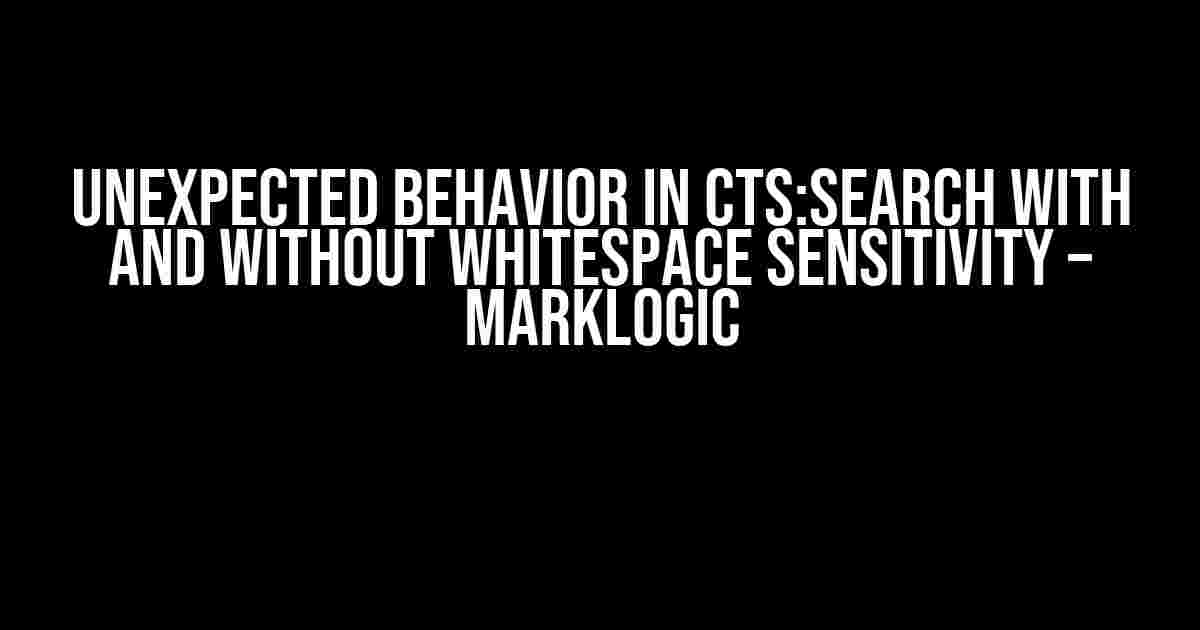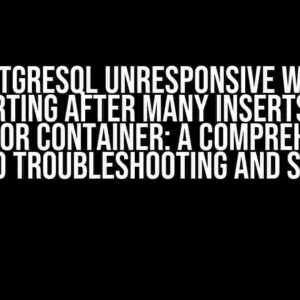Introduction
Are you struggling to understand the behavior of cts:search in MarkLogic when dealing with whitespace sensitivity? Well, you’re not alone! Many developers have stumbled upon this issue, and today, we’re going to dive deep into the world of whitespace sensitivity and how it affects your search results.
In this article, we’ll explore the unexpected behavior of cts:search with and without whitespace sensitivity, and provide you with practical solutions to tackle this challenge. By the end of this article, you’ll be equipped with the knowledge to optimize your search queries and get the results you expect.
What is Whitespace Sensitivity?
In MarkLogic, whitespace sensitivity refers to how the database handles whitespace characters (such as spaces, tabs, and line breaks) in search queries. By default, MarkLogic is whitespace-insensitive, meaning that it ignores whitespace characters when searching for terms.
For example, if you have a document with the phrase “New York Times” and you search for “NewYork Times” (without the space), MarkLogic will still match the document because it ignores the whitespace character.
cts:search(fn:doc(), "NewYork Times")
This behavior can be useful in many cases, but it can also lead to unexpected results when dealing with phrases that contain whitespace characters.
The Problem with Whitespace Sensitivity
When you enable whitespace sensitivity in MarkLogic, the database starts to treat whitespace characters as significant. This means that search queries must match the exact phrase, including whitespace characters.
Let’s take the previous example again, but this time with whitespace sensitivity enabled:
cts:search(fn:doc(), "NewYork Times", ("whitespace-sensitive" : true()))
In this case, the search query will not match the document because the phrase “NewYork Times” doesn’t match the exact phrase “New York Times” in the document.
This behavior can be problematic when you’re dealing with phrases that contain whitespace characters, as it can lead to false negatives (i.e., missing relevant results).
Understanding the Impact of Whitespace Sensitivity
To understand the impact of whitespace sensitivity, let’s explore some scenarios:
Scenario 1: Whitespace-Insensitive Search
In this scenario, we’ll search for the phrase “New York Times” without enabling whitespace sensitivity:
cts:search(fn:doc(), "New York Times")
This query will return documents that contain the phrase “New York Times”, as well as documents that contain variations of the phrase, such as “NewYork Times” or “New YorkTimes”.
Scenario 2: Whitespace-Sensitive Search
In this scenario, we’ll search for the same phrase, but with whitespace sensitivity enabled:
cts:search(fn:doc(), "New York Times", ("whitespace-sensitive" : true()))
This query will only return documents that contain the exact phrase “New York Times”, with the exact whitespace characters.
Scenario 3: Phrase Search with Quotation Marks
In this scenario, we’ll search for the phrase “New York Times” using quotation marks:
cts:search(fn:doc(), "\"New York Times\"")
This query will return documents that contain the exact phrase “New York Times”, with the exact whitespace characters, and will ignore variations of the phrase.
Tips and Tricks for Handling Whitespace Sensitivity
Now that we’ve explored the impact of whitespace sensitivity, let’s discuss some tips and tricks for handling this challenge:
-
Use Quotation Marks for Phrase Search: When searching for phrases, use quotation marks to ensure that the exact phrase is matched.
-
Enable Whitespace Sensitivity for Exact Matches: When you need to match exact phrases with whitespace characters, enable whitespace sensitivity.
-
Use Tokenization for Token-Based Search: When searching for individual tokens (such as words or phrases), use tokenization to split the search query into individual tokens.
-
Avoid Whitespace Characters in Search Queries: When possible, avoid using whitespace characters in search queries to avoid unexpected results.
-
Use Regular Expressions for Pattern-Based Search: When searching for patterns, use regular expressions to match the desired pattern.
Best Practices for cts:search with Whitespace Sensitivity
To ensure that your search queries return the expected results, follow these best practices:
-
Use the correct quotation marks: When searching for phrases, use double quotation marks (“”) to enclose the phrase.
-
Specify the correct whitespace sensitivity option: When enabling whitespace sensitivity, specify the correct option (“whitespace-sensitive” : true()) to ensure that the search query is treated as whitespace-sensitive.
-
Test your search queries: Always test your search queries with different scenarios to ensure that they return the expected results.
-
Use the correct indexing options: Ensure that your documents are indexed correctly to support whitespace-sensitive search queries.
-
Optimize your search queries for performance: Optimize your search queries to ensure that they perform efficiently and return the expected results.
Conclusion
In conclusion, understanding whitespace sensitivity is crucial when working with cts:search in MarkLogic. By following the tips and tricks outlined in this article, you can optimize your search queries to return the expected results and avoid unexpected behavior.
Remember to test your search queries with different scenarios, specify the correct whitespace sensitivity options, and optimize your search queries for performance. With these best practices, you’ll be well on your way to mastering the art of search in MarkLogic.
| Scenario | Search Query | Expected Results |
|---|---|---|
| Whitespace-Insensitive Search | cts:search(fn:doc(), "New York Times") |
Documents with phrases “New York Times”, “NewYork Times”, “New YorkTimes”, etc. |
| Whitespace-Sensitive Search | cts:search(fn:doc(), "New York Times", ("whitespace-sensitive" : true())) |
Documents with exact phrase “New York Times” only |
| Phrase Search with Quotation Marks | cts:search(fn:doc(), "\"New York Times\"") |
Documents with exact phrase “New York Times” only |
I hope this article has provided you with a comprehensive understanding of unexpected behavior in cts:search with and without whitespace sensitivity in MarkLogic. If you have any further questions or need more clarification on this topic, feel free to ask in the comments below!
Here are 5 Questions and Answers about “Unexpected Behavior in cts search with and without Whitespace Sensitivity – MarkLogic”:
Frequently Asked Question
Get the answers to your questions about unexpected behavior in cts search with and without whitespace sensitivity in MarkLogic.
What is whitespace sensitivity in cts search?
Whitespace sensitivity in cts search refers to the ability of MarkLogic to consider or ignore whitespace characters such as spaces, tabs, and line breaks when searching for phrases or terms. This sensitivity can significantly impact the accuracy and relevance of search results.
What happens when I enable whitespace sensitivity in cts search?
When you enable whitespace sensitivity in cts search, MarkLogic treats whitespace characters as significant characters, meaning that the search results will exactly match the search phrase, including the whitespace characters. This can be useful when searching for exact phrases or phrases with specific wording.
What happens when I disable whitespace sensitivity in cts search?
When you disable whitespace sensitivity in cts search, MarkLogic ignores whitespace characters, treating them as insignificant. This can lead to more flexible search results, as the search engine will match phrases or terms regardless of the whitespace characters between them.
Why do I get unexpected results when searching with whitespace sensitivity enabled?
You may get unexpected results when searching with whitespace sensitivity enabled if your search phrase contains unnecessary whitespace characters or if the indexed data contains inconsistent whitespace characters. To avoid this, ensure that your search phrase is properly formatted and that your indexed data is consistently formatted.
How can I troubleshoot issues with whitespace sensitivity in cts search?
To troubleshoot issues with whitespace sensitivity in cts search, check your search phrase and indexed data for inconsistencies in whitespace characters. You can also use MarkLogic’s built-in debugging tools, such as the Query Console, to test your search queries and analyze the search results.


